| Listing 1 - 10 of 16 | << page >> |
Sort by
|
Book
ISBN: 9781107635685 9781107058651 9781107415935 1107635683 1107058651 1107415934 1316666093 1316667146 Year: 2016 Publisher: Cambridge Cambridge University Press
Abstract | Keywords | Export | Availability | Bookmark
 Loading...
Loading...Choose an application
- Reference Manager
- EndNote
- RefWorks (Direct export to RefWorks)
For more than 1500 years, Confucianism has played a major role in shaping Japan's history - from the formation of the first Japanese states during the first millennium AD, to Japan's modernization in the nineteenth century, to World War II and its still unresolved legacies across East Asia today. In an illuminating and provocative new study, Kiri Paramore analyses the dynamic history of Japanese Confucianism, revealing its many cultural manifestations, as religion and as a political tool, as social capital and public discourse, as well as its role in international relations and statecraft. The book demonstrates the processes through which Confucianism was historically linked to other phenomenon, such as the rise of modern science and East Asian liberalism. In doing so, it offers new perspectives on the sociology of Confucianism and its impact on society, culture and politics across East Asia, past and present.
J1440 --- Japan: Philosophy -- Confucianism --- Confucianism --- Japan --- Civilization. --- Confucianism - Japan --- Japan - Civilization.
Book
ISBN: 0691008388 Year: 1989 Publisher: Princeton Princeton university press
Abstract | Keywords | Export | Availability | Bookmark
 Loading...
Loading...Choose an application
- Reference Manager
- EndNote
- RefWorks (Direct export to RefWorks)
Book
ISBN: 9780190906184 Year: 2022 Publisher: New York Oxford University Press
Abstract | Keywords | Export | Availability | Bookmark
 Loading...
Loading...Choose an application
- Reference Manager
- EndNote
- RefWorks (Direct export to RefWorks)
"A vast and complex tradition foundational to East Asian civilizations, Confucianism continues to be a cultural force of global significance. The Oxford Handbook of Confucianism is a collection of 38 essays that explore the variety, complexity, and richness of Confucianism over time and across regions. These essays are written to be of value to the educated public while presenting new scholarship and fresh perspectives from leading scholars in Confucian studies. Using a range of critical approaches, the volume is divided into four parts. Confucianism presents unique problems to study and interpretation, and the introductory section offers three essays exploring the history and criticism of East Asian and Western constructions of the tradition. The bulk of the volume's essays are divided into three parts. The first part considers Confucianism's development within the Chinese context, centering on historical moments, key figures, and formative texts. The second part analyzes the development, impact, and reach of Confucianism in Japan, Korea, Vietnam, Singapore, Malaysia and Indonesia, and "Boston" Confucianism. The final part offers topical studies of the impact of Confucianism in culture, politics and government, social structures, and ideology, exploring topics as wide-ranging as family, social structure, gender, visual and literary arts, government, ethics, religion, and ritual. Expansive in scope and sophisticated in approach, the Oxford Handbook of Confucianism presents a superb resource for study of this ancient, and still vibrant tradition"--
Book
ISBN: 9780190492014 Year: 2016 Publisher: New York Oxford University Press
Abstract | Keywords | Export | Availability | Bookmark
 Loading...
Loading...Choose an application
- Reference Manager
- EndNote
- RefWorks (Direct export to RefWorks)
Neo-Confucianism. --- Confucianism --- Confucianists. --- S02/0310 --- S12/0400 --- J1440 --- K9040 --- China: General works--Intercultural dialogue --- China: Philosophy and Classics--Kongzi 孔子 Confucius and Confucianism --- Japan: Philosophy -- Confucianism --- Korea: Philosophy and thought -- schools -- Confucianism
Book
ISBN: 9780674237261 0674237269 9781684175994 1684175992 Year: 2020 Publisher: Cambridge Harvard University Asia Center
Abstract | Keywords | Export | Availability | Bookmark
 Loading...
Loading...Choose an application
- Reference Manager
- EndNote
- RefWorks (Direct export to RefWorks)
"Provides the first overview of the richly documented and colorful Japanese version of the East Asian ritual to venerate Confucius, known in Japan as the sekiten. Traces the evolution of the sekiten in Japan from pre-modern times up to the present"--
Confucianism --- J1440 --- J1719 --- Religions --- Rituals --- History --- Customs and practices --- Japan: Philosophy -- Confucianism --- Japan: Religion in general -- religion and state --- Japan --- Religious life and customs. --- Confucius --- Japan&delete& --- Customs and practices&delete& --- Rituals&delete& --- History.
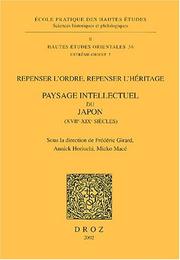
ISSN: 10167005 ISBN: 2600006419 9782600006415 Year: 2002 Volume: 36 2 Publisher: Genève Droz
Abstract | Keywords | Export | Availability | Bookmark
 Loading...
Loading...Choose an application
- Reference Manager
- EndNote
- RefWorks (Direct export to RefWorks)
Japan --- History --- Social life and customs --- Intellectual life --- -Japan --- 1600-1868 --- 17th century --- 18th century --- 19th century --- J1440 --- J1008.60 --- Japan: Philosophy -- Confucianism --- Japan: Philosophy -- history -- Kinsei, Edo, Tokugawa period, early modern (1600-1867) --- Japan - History - 17th century --- Japan - History - 18th century --- Japan - History - 19th century --- Japan - Social life and customs - 1600-1868
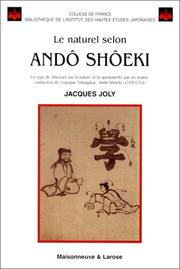
ISBN: 2706812257 9782706812255 Year: 1996 Publisher: Paris Maisonneuve et Larose
Abstract | Keywords | Export | Availability | Bookmark
 Loading...
Loading...Choose an application
- Reference Manager
- EndNote
- RefWorks (Direct export to RefWorks)
Philosophy of nature --- Ando, Shoeki, --- J1560 --- J1440 --- Japan: Philosophy -- individual philosophers -- Kinsei, Edo, Tokugawa period, early modern (1600-1867) --- Japan: Philosophy -- Confucianism --- Nature --- Nature, Philosophy of --- Natural theology --- Philosophy --- Andō, Shōeki, --- Andō, Ryōchū, --- Ando, Seéki, --- Fujiwara, Kakuryūdō, --- Fujiwara, Ryōchū, --- Kakuryūdō Fujiwara, --- Ryōchū Fujiwara, --- Shōeki, Andō, --- 安藤昌益, --- 安蕂昌益, --- Ando, Shoeki, - fl. 1744-1763
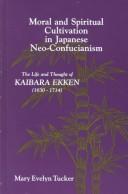
ISBN: 088706891X Year: 1989 Publisher: Albany (N.Y.) : State university of New York press,
Abstract | Keywords | Export | Availability | Bookmark
 Loading...
Loading...Choose an application
- Reference Manager
- EndNote
- RefWorks (Direct export to RefWorks)
J1008.60 --- J1440 --- J1560 --- J1650 --- Japan: Philosophy -- history -- Kinsei, Edo, Tokugawa period, early modern (1600-1867) --- Japan: Philosophy -- Confucianism --- Japan: Philosophy -- individual philosophers -- Kinsei, Edo, Tokugawa period, early modern (1600-1867) --- Japan: Philosophy -- ethics --- Kaibara, Ekiken, --- Kaibara, Atsunobu --- Ekiken, Kaibara, --- Kaibara, Ekken --- Sonken --- Kaibara, Sukesaburō --- Kaibara, Kyūbē --- Kaibara, Shisei --- 貝原盆軒 --- 貝原益軒 --- 貝原篤信 --- 카이바라, 에키켄
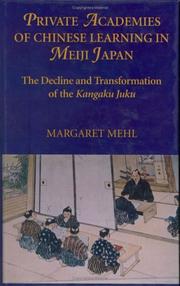
ISBN: 8791114039 8791114942 9788791114038 9788791114946 Year: 2003 Volume: 92 Publisher: Copenhagen NIAS
Abstract | Keywords | Export | Availability | Bookmark
 Loading...
Loading...Choose an application
- Reference Manager
- EndNote
- RefWorks (Direct export to RefWorks)
Private schools --- Education --- History --- J1440 --- J1008.60 --- J4920 --- J4900.60 --- S01/0500 --- Japan: Philosophy -- Confucianism --- Japan: Philosophy -- history -- Kinsei, Edo, Tokugawa period, early modern (1600-1867) --- Japan: Education -- systems and organization --- Japan: Education -- history -- Kinsei, Edo, Tokugawa period, early modern (1600-1867) --- China: Bibliography and reference--Sinology, sinological institutes, proceedings of conferences --- S02/0200 --- China: General works--Civilization and culture --- 19th century --- Japan --- Manners and customs --- 1868-1912 --- Private schools - Japan - History - 19th century. --- Education - Japan - History - 19th century.
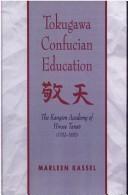
ISBN: 0585043078 9780585043074 9780791428078 0791428079 0791428087 1438408420 9780791428085 9781438408422 Year: 1996 Publisher: Albany : State University of New York Press
Abstract | Keywords | Export | Availability | Bookmark
 Loading...
Loading...Choose an application
- Reference Manager
- EndNote
- RefWorks (Direct export to RefWorks)
Presents the philosophy and values of Hirose Tanso, a scholar, educator, and poet whose well-articulated educational program was partly responsible for the relative ease with which Japan emerged from hundreds of years of self-imposed isolation and became a powerful modern nation.This book presents the world of Hirose Tanso, a late Tokugawa period (1603-1868) educator whose goal was to train men of talent in practical learning for the benefit of the country. Tanso founded a private academy called Kangien in Hita City of present-day Oita prefecture. Some 3,000 young men from 64 of the then total 68 provinces of Japan were educated at Kangien during Tanso's 50-year career as educator and administrator.Firm in his conviction that the problems he and others faced in contemporary society would be solved by setting right the moral priorities of the people, Tanso established an educational program at Kangien based on the Neo-Confucian philosophical construct of reverence for Heaven. Tanso's educational program taught students reverence for Heaven by engaging in moral self-cultivation in the practice of actions of day-to-day behavior. Students were required to adhere to stringent school regulations governing every aspect of daily life at the school and to engage in a systematic study of a Confucian educational curriculum with concomitant, rigorous testing exercises. Tanso believed that an educational program supported by the twin pillars of regulations and curriculum would, by its very nature, accomplish social reform.The microcosm of society Tanso created at Kangien provides a window through which the reader can glimpse the confluence of three important components of late Tokugawa society, institutional development; philosophical trends; and social structure. The values that Tanso stressed, study; hard work; frugality; and promotion based on merit, were, in many ways, responsible for the relative ease with which Japan emerged from hundreds of years of self-imposed isolation and became a powerful modern nation.
Confucian education --- Neo-Confucianism --- Philosophy & Religion --- Philosophy --- Confucian religious education --- Religious education --- Confucianism --- Philosophy, Chinese --- Study and teaching --- Hirose, Tansō, --- 広瀨淡窓, --- 広瀨淡窗, --- 広瀬淡窓, --- 廣瀨淡窓, --- 廣瀨淡窻, --- 廣瀬淡窓, --- 廣瀬淡窻, --- Kangien. --- Kangien Academy --- J1440 --- J4900.60 --- J4979.10 --- Japan: Philosophy -- Confucianism --- Japan: Education -- history -- Kinsei, Edo, Tokugawa period, early modern (1600-1867) --- Japan: Education -- moral education --- E-books --- Hirose, Tansō, --- Kangien --- Confucian education - Japan --- Neo-Confucianism - Study and teaching - Japan --- Hirose, Tansō, - 1782-1856
| Listing 1 - 10 of 16 | << page >> |
Sort by
|

 Search
Search Feedback
Feedback About UniCat
About UniCat  Help
Help News
News